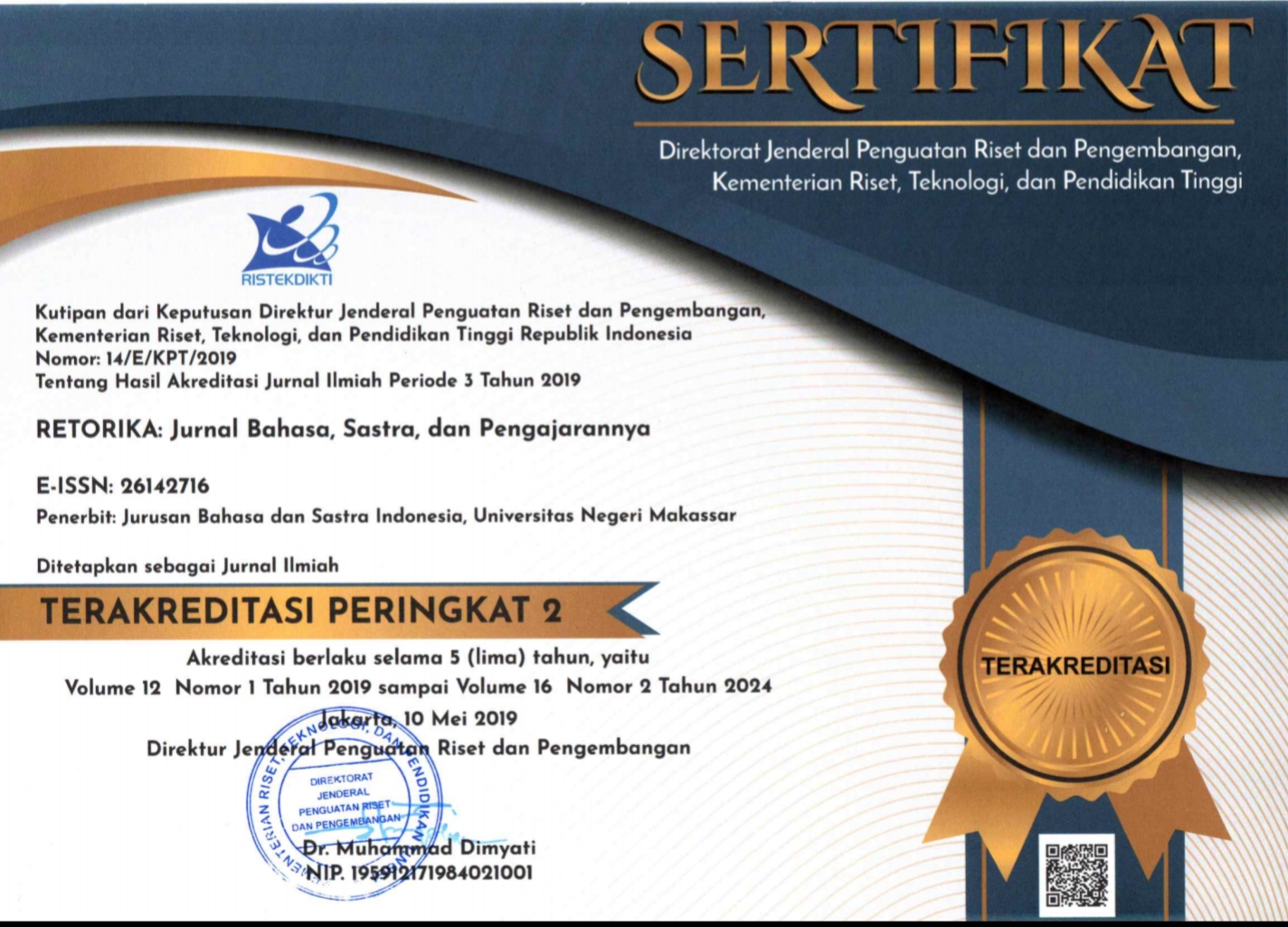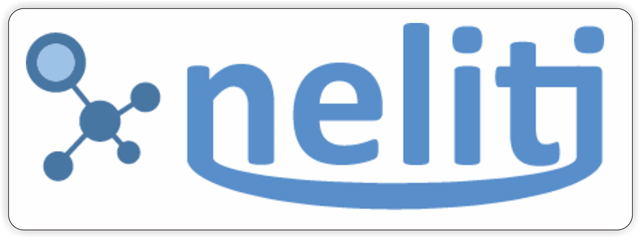SEMANTIK PROTOTIPE KORUPSI: KAJIAN LINGUISTIK KOGNITIF
(1) Brawijaya University
(2) Brawijaya University
(3) Brawijaya University
(*) Corresponding Author
DOI: https://doi.org/10.26858/retorika.v11i2.5137
Abstract
Semantics Corruption Prototype: Cognitive Linguistic Study. Semantic Prototype Corruption: Cognitive Linguistics Review. This study aims to define corruption through prototype theory in cognitive linguistics. The research is designed through a qualitative-quantitative approach with Tomaszczyk (2007) prototype theory. The results of the study indicate that the most corrupt variables affecting the degree of corruption are (1) 'unlawful rewards' and (2) 'abuse of authority', while (3) 'knowing that it is corruption' and (4) 'corrupt intent' no effect. Based on the background of respondents there is no difference in the degree of degree of corruption.
Keywords
Full Text:
PDFReferences
Ayatullah, A.L. 2014. Korupsi dalam Wacana Pers Lo-kal: Analisis Wacana Kritis Norman Fairclough terhadap Teks Berita Kasus Hambalang Tahun 2013 ada Surat Kabar Malang Post. Jurnal Mahasiswa Sosiologi,3(1):1–16.
Azra, Azyumardi. 2002. Korupsi dalam Perspektif Good Governance. Jurnal Kriminologi Indonesia, 2(1): 31–36.
Coleman, Linda dan Paul Kay. 1981. Prototype Semantics: The English Word Lie. Language, 57(1): 26–44
Creswell, J., W. 2012. Research Design Pendekatan Kualitatif, Kuantitatif, dan Mixed. Yogyakarta: Pustaka Pelajar
Croft, William dan D. Alan Cruse. 2004. Cognitive Linguistics. London: Cambridge University Press.
Geeraterts, Dirk. 2006. Prospects and Problems of Prototype Theory. Dalam Dirk Geeraterts, dkk. (Ed). Cognitive Linguistics Basic Readings(page 141—166). Berlin dan New York: Mouton de Gruyter,
Geeraterts, Dick. 2016. Prospect and Problems of Proto-type Theory. Diacronia, 3(1): 1–16.
Indonesia Corruption Wacth (ICW). 2017. Trend Penin-dasan Kasus Korupsi Tahun 2017. Bahan Presentasi. (online). https://antikorupsi.org/sites/ default/files/tren_korupsi_2017.pdf
Kamus Besar Bahasa Indonesia. 2008. Jakarta: Pusat Bahasa
Khairani, R. & Putri D. E. 2009. Perbedaan Kematangan Emosi pada Pria dan Wanita yag Menikah Muda. Makalah Disajikan Dalam Proceeding PESAT (Psikologi, Ekonomi, Sastra, Arsitektur, & Sipil) Universitas Gunadarma, 20—21 Oktober 2009.
Kushartanti, U. Y. Dan Multamia Lauder. 2010. Pesona Bahasa. Jakarta: Gramedia.
Lipka, Leonhard. 1986. Linguistics across Historical and Geographical Boundaries. Berlin: Walter
Lyons, John. 1979. Semantics (Volume I). London: Cambridge University Press.
Marwan, Ali. 2016. Mengkritisi Pemberlakuan Teori Fiksi Hukum. Jurnal Penelitian Hukum De Jure, 16(3): 251–264.
Nurjannah. 2013. Semantik Prototipe pada Leksem Bu-le melalui Kognisi Orang Indonesia. Prosiding Seminar Internasional Studi Bahasa dari Berba-gai Perspektif dalam Rangka Ulang Tahun ke-80 Prof. Dr. Soepomo Poedjosoedarmo. hlm. 755—765. Yogyakarta: Universitas Gadjah Mada.
Pasaribu, Truly Almendo. 2013. Analisis Linguistik Kognitif pada Polisemi Leksem CUT. Tesis. Yogyakarta: FIB Universitas Gadjah Mada.
Prayudha. 2013. Analisis Prototipe Semantik Korupsi ‘Penyuapan’ sebagai Perspektif Alternatif Pem-berantasan Korupsi: Studi Linguistik Antropo-logis. (Online). http://www.academia.edu/ 8148-397/ANALISIS_SEMANTIK_PROTOTIPE_KORUPSI_SEBUAH_KAJIAN_LINGUISTIK_KOGNITIF). Diakses tanggal 13 Maret 2018
Ridhwan. 2017. Strategi Belajar dan Mengajar di Per-guruan Tinggi. (Online). http://stitahs.com/ artikel-dosen/23-artikel-dosen-stit/27-strategi-mengajar-dan-belajar-di-perguruan-tinggi. Diak-ses 31 Agustus 2018
Sina, La. 2008. Dampak & Upaya Pemberantasan serta Pengawasan Korupsi di Indonesia. Jurnal Hukum Pro Justisia, 26(1): 39–45.
Tanzi, V. 1998. Corruption Around the World: Causes, Consequences, Scopes, and Cures. IMF Working Paper. IMF Fiscal Affairs Department.
Article Metrics
Abstract view : 2371 times | PDF view : 616 timesRefbacks
- There are currently no refbacks.
Copyright (c) 2018 Millatuz Zakiyah, Noveria Anggraeni Fiaji, Prima Zulvarina

This work is licensed under a Creative Commons Attribution-NonCommercial 4.0 International License.
Published by:
Department of Indonesian Language, Faculty of Languages and Literature, Universitas Negeri Makassar in cooperate with Asosiasi Dosen Bahasa dan Sastra Indonesia (ADOBSI) and Ikatan Program Studi Pendidikan Bahasa dan Sastra Indonesia (IKAPROBSI).
Address: Department of Indonesian Language Office, DG Building Second Floor, UNM Parangtambung, Daeng Tata Raya Street, Makassar, South Sulawesi, Indonesia
 Email: retorika@unm.ac.id
Email: retorika@unm.ac.id

RETORIKA: Jurnal Bahasa, Sastra,dan Pengajarannya is licensed under a Creative Commons Attribution-NonCommercial 4.0 International License.
















